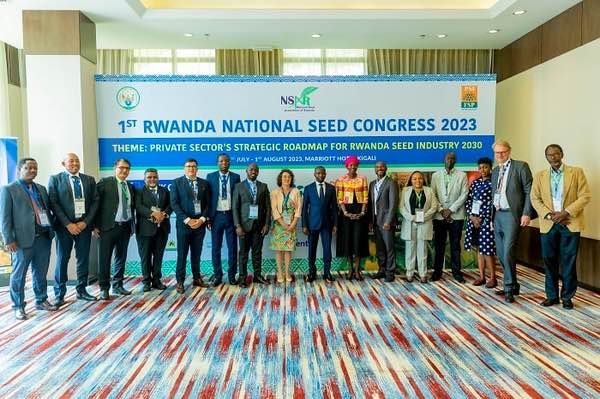
Minister of Agriculture, Dr Ildephonse Musafiri
Rwanda today held its first National Seed Congress bringing together actors in the country’s seed sector, a two-day event that is happening in Kigali from July 31st to August 1st, 2023.
The meeting was organised by the National Seed Association of Rwanda (NSAR) in partnership with the country’s Private Sector Federation (PSF), the Ministry of Agriculture and Animal Resources (MINAGRI), the Ministry of Trade and Industry (MINICOM), One Acre Fund, Bank of Kigali (BK), and other key stakeholders in agriculture sector.
It aims to review relevant strategic goals in the country’s seed sector, facilitate mutual accountability, and identify synergies, linkages, and complementarities on the achievement of the main goals about the private sector’s Rwanda strategic roadmap for seed industry from now up to 2030.
“Quality seed, being a crucial input in agriculture, holds immense significance for our farming community. However, one of the significant challenges we still face is the underutilization of quality seeds by our farmers. There are encouraging adoption rates of improved seed use among Large Scale farmers, reaching as high as 85.7%. Yet, the adoption rate drops significantly to 35.9% among our Small Scale farmers, resulting in an overall utilization rate of 37.1%. This discrepancy highlights the pressing issue of affordability, especially concerning imported seed varieties. It also emphasizes the urgent need to strengthen our extension services, providing valuable support and guidance to our farmers in order to reach a 100% improved seed utilization rate. However, on a positive note, the availability of different seed varieties is noteworthy, with substantial quantities of maize (6,815.5 T), wheat (445 T), soybean (321 T), beans (216 T), and potato (28,000 T), along with cassava cuttings (63,834,500)”, Minister Of Agriculture and Animal Ressouces , Ildephose Musafiri, said when opening the Forum.

Group photo of delegates at the national seed congress
He added the maize seed industry notably has demonstrated the potential of local seed production. This success has been made possible by the government’s instrumental role in establishing essential infrastructure. As a result, maize seed has become more readily available, accessible, and affordable for farmers, leading to the creation of new job opportunities and continuously improving yields.
Organised under the theme of “Private Sector’s Strategic Roadmap for Rwanda Seed Industry 2030”, the first Rwanda National Seed Congress 2023, will lay a foundation towards driving a 7-year agenda for attaining food and nutrition security, reducing poverty, boosting intra-African trade, and enhancing the resilience of production systems and future investments by starting with the right seeds.
Speaking about the event, NSAR’s Chairperson, Innocent Namuhoranye, described the meeting as an opportunity to review improvements made in Rwanda’s seed system over the last seven years, identify remaining gaps, and plan for the journey ahead towards a well-defined and stable framework for the development of an effective and sustainable seed system in Rwanda.
“Through the Private sector lens, we intend to offer an opportunity for us all to share our views and recommendations for the improvement of existing seed policies and legislation, taking into consideration local, regional and internationally accepted practices and processes,” he said in a message welcoming stakeholders to the meeting.
The first Rwanda National Seed Congress 2023 will bring together about 800 representatives of seed companies, seed specialists, and seed policymakers from Rwanda, the continent and the globe.
Among other topics, the congress will discuss on the private sector’s Strategic Roadmap for Rwanda Seed Industry 2030, how to transform Africa’s agriculture through building robust and resilient seed systems, how to attract young bright talent into the agriculture sector, how farmers can benefit from quality seeds emerging from improved varieties, and how to get financing solutions for agricultural value chains. (End)
